Island instinct
The question “who can live well in Rus'” does not lose its relevance, but answering it is perhaps even more difficult than a century and a half ago. You can’t have a good time today, you can’t have fun in Rus' to your heart’s content. Those who love the beautiful life are now living the most freely and cheerfully of all those who got rid of Russian assets in time and left Rus', as they say, with both ends. A striking example of such foresight is Dmitry Rybolovlev, once a Russian entrepreneur and now the president of the Monaco football club.
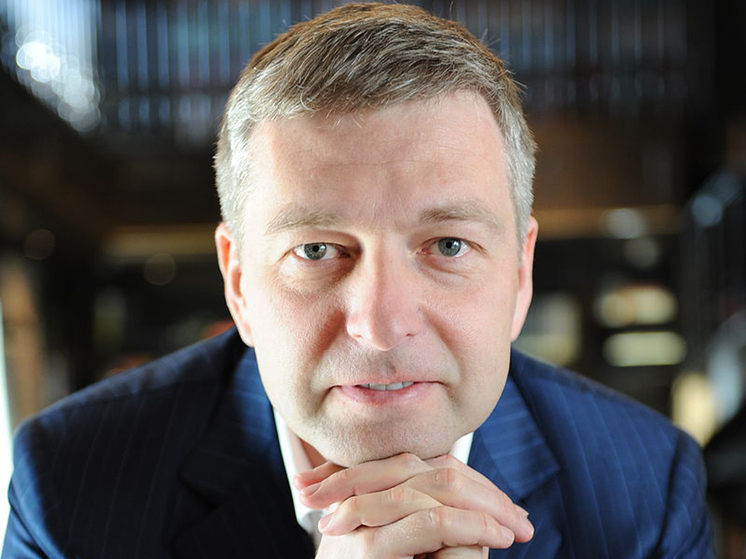
Of course, Dmitry Evgenievich has other assets and, accordingly, other regalia, but in the Forbes list of “110 Russian billionaires” he appears precisely as the president of Monaco, and specialists know better. Therefore, of Rybolovlev’s well-known properties, this is the most prestigious and status one. In general, assets are simply designated as “investments.” In the “Russian” Forbes list, Rybolovlev ranks 26th, with a fortune estimated at $6.4 billion.
 Prince Albert II of Monaco (left) and owner of the Monaco football club Dmitry Rybolovlev (right) after the Champions League group stage match between FC Zenit (Russia, St. Petersburg) and FC Monaco (Monaco).
Prince Albert II of Monaco (left) and owner of the Monaco football club Dmitry Rybolovlev (right) after the Champions League group stage match between FC Zenit (Russia, St. Petersburg) and FC Monaco (Monaco).
The formation of this grandiose money mountain, like most other Russian “golden mountains”, began at the beginning of the “dashing 1990s”. Dmitry Rybolovlev’s first business was the medical cooperative Magnetix, which treated its client patients using magnetic therapy. It was a family enterprise: he and his father created the cooperative. It was his father who was the author of the treatment method used — this was the topic of his doctoral dissertation.
Both father and mother were medical scientists who taught at the Perm Medical Institute (now Perm State Medical University). At first, my son followed the same path. After school, I entered the “parental” medical institute, the medical faculty. And although, in his own words, he was a “professor’s son,” it’s difficult to call him a freeloader: he began his career while still studying at the university, in his second year.
First he worked as an orderly, then as a nurse. After graduation, he became an intern doctor (in the cardiac intensive care unit of the 2nd City Clinical Hospital). In general, life followed a well-trodden rut. As he himself assures, he had no desire for entrepreneurship.
“It’s simple,” Rybolovlev explained in one of his few interviews (Vedomosti, 2006) the reason for the change of field. — I graduated from the institute in 1990. Perestroika was already in full swing. And it turned out that my salary was 120 rubles and a bonus of 10 rubles for a diploma with honors. And I got married in my third year, and by that time we already had a small child. Therefore, it’s not that I really wanted to, but rather had to go into business. However, over time I liked it even more.”
He liked it so much that soon he completely parted with medicine: he went to where the real, serious, big money was made — into the financial sector. But even here he acted like a “professor’s son” and an excellent student — he began a new career by receiving a specialized education: he went to Moscow and entered the courses for securities specialists that had just opened under the Ministry of Finance. After receiving a diploma as a broker and returning to Perm, he opened his own investment company. Then — investment bank.
“This helped build relationships with major enterprises,” he shares the secret of his success. “And when privatization began, I was one of the few people in the region prepared for it. Concentration on the chemical industry, and then on the narrower potash industry, happened by itself — in the process of selecting enterprises in which, as it seemed to us, it was worth investing… The choice was very simple. We invested in those enterprises that worked for export. Our products were automatically competitive abroad.”
In 1996, Rybolovlev headed the board of directors of Uralkali, one of the world's largest producers of potash fertilizers. By 2000, he consolidated a controlling stake in the company, which became the main pearl of his business empire. The path from an intern with a salary that was not enough until the next payday to a multimillionaire took a few years. But at approximately the same speed and in the same way, other fortunes were made in Russia in that era.
 In the Uralkali potash mine » Photo: Uralkali
In the Uralkali potash mine » Photo: Uralkali
There was, of course, little justice in this initial accumulation of capital. But to say that Rybolovlev came to his wealth easily, joking that it fell on him on its own, would also not be entirely fair. The road to the stars ran through considerable thorns. Business in those years, especially a business of such a scale and such profitability, was a real struggle for survival. Including for physical survival.
As Rybolovlev himself assured, he never paid the bandits, “he never even discussed any kind of roof with anyone,” although “of course, there were approaches from the outside.” He also claimed that “there were no serious problems with crime” and that he felt “quite confident and safe.” But this, apparently, is just an act. Which follows from his own words. Yes, he himself was not afraid of anything, because “business and fear are incompatible things.” But “he feared for the safety of his family, so he took her to Switzerland back in 1995.”
It is also known that Dmitry Rybolovlev then had to assign bodyguards to his parents and provide security for the directors of all his enterprises. And he himself only went out into the street under the cover of a human shield of security guards. In general, it was a “fun” time. But soon it became even more fun. In September 1995, Evgeny Panteleimonov, director of the Neftekhimik enterprise owned by Rybolovlev, was killed. They say that Panteleimonov was the only one of Rybolovlev’s top managers who refused security.
Nevertheless, it was Rybolovlev who was accused of the murder and its organization — he was arrested and spent almost a year in a pre-trial detention center. “I prepared to sit for 10 years,” he later said (interview with Forbes, 2009). — Hopes all end very quickly, in fact. At first you think that this is a mistake, that in a day or two or three, this whole nightmare will be over. But somewhere, probably about two weeks later, I realized that this situation was not quick and that this was not accidental.”
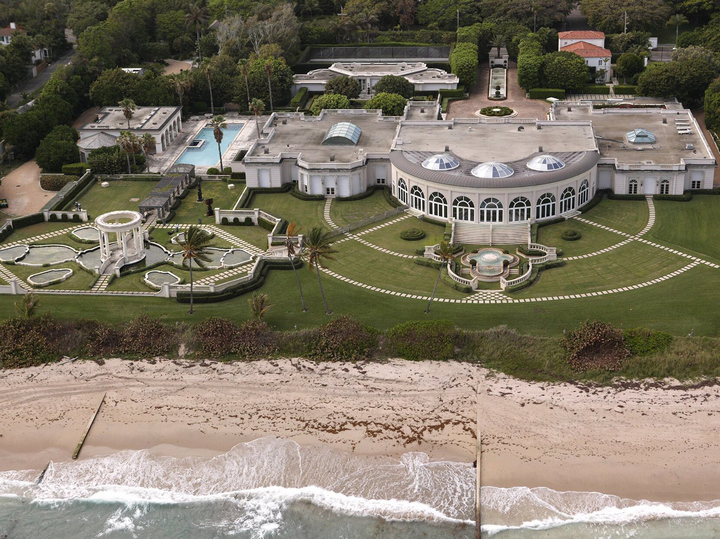 Another “calling card” of Dmitry Rybolovlev is his Maison de L'Amitie mansion in Palm Beach (USA, Florida).< /span>
Another “calling card” of Dmitry Rybolovlev is his Maison de L'Amitie mansion in Palm Beach (USA, Florida).< /span>
The case eventually fell apart: Rybolovlev was completely acquitted. The Presidium of the Supreme Court of the Russian Federation put the final stop to his persecution. Rybolovlev, in his words, came out of prison as a “different person.” One of the main lessons learned was this: “I realized that it is extremely important to properly build relationships with many people, including the authorities. Previously, I was just doing business and didn’t try to integrate into this system. But after everything that happened to me, I tried to correct this mistake. Now I am sure that big business cannot exist outside the state.”
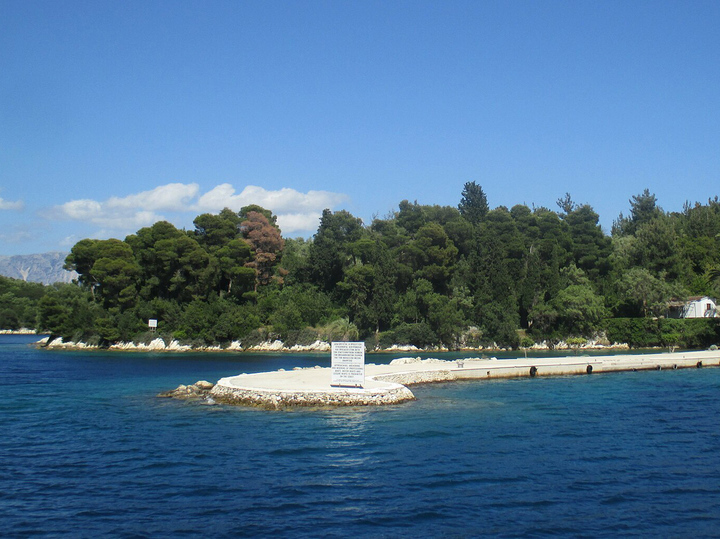 Rybolovlev leased the Greek island of Skorpios for 99 years for about 100 million euros.
Rybolovlev leased the Greek island of Skorpios for 99 years for about 100 million euros.
Rybolovlev made political investments as accurately as financial ones. In 2000, during the elections for the head of the Perm region, Rybolovlev supported — both publicly and financially — Yuri Trutnev (now Deputy Chairman of the Government of the Russian Federation — Presidential Plenipotentiary Representative in the Far Eastern Federal District). And the bet played out very well.
Trutnev, firstly, won. Secondly, he did not stop there — the official’s career quickly took off: in the spring of 2004, before serving his term as governor, he moved to Moscow, to the post of Minister of Natural Resources of Russia. Thirdly, judging by a number of signs, he did not forget about who provided him with the starting takeoff.
The relationship that began between Rybolovlev and Trutnev is sometimes called friendly. It is difficult to say how objective such an assessment is, but at least they definitely did not experience antipathy towards each other. According to rumors, Trutnev, as the head of the Ministry of Natural Resources, played an important role in the relatively successful outcome for the oligarch of the story associated with the accident at the oldest Uralkali mine, located in the city of Berezniki.
This happened in 2006. A saline solution was released inside the development, causing a sharp increase in hydrogen sulfide content in the air. Work at the mine became impossible, and the company management decided to flood it. There were no casualties, but the flooding of the mine had serious environmental consequences: ground failures began in Berezniki. Nevertheless, the government commission, headed by Yuri Trutnev, came to the conclusion that management was not to blame for the accident: the cause was recognized as a complex of man-made and geological factors.
If the company had been found guilty, it would have been liable a huge, ruinous fine was imposed: the total amount of penalties could reach up to three billion dollars. The company ultimately got away with 7.8 billion rubles (at that time — March 2009 — it was about $230 million), having provided voluntary, within the framework of social responsibility, assistance in eliminating the consequences of the accident.
Around the same time, an accident occurred in the family life of Dmitry Evgenievich: in December 2008, his wife Elena, with whom they had lived together for more than 20 years (they got married while still students), initiated divorce proceedings, motivating her step by her husband’s infidelities. The statement of claim filed in the Geneva court said that she was “fed up with Dmitry’s tenderness towards other women.” As an example of betrayal, it was reported about the husband's walks on a yacht “in the company of young girls and his mistress.”
The ex-wife demanded half of the jointly acquired property. Her claims totaled $5.1 billion — $4.5 billion in cash plus real estate, jewelry and art totaling $560 million. And the Geneva court granted the claim.
However, the story, of course, did not end there. The litigation dragged on for seven years. Ultimately, in 2015, Rybolovlev managed to get the decision revised: the monetary part of the compensation was reduced by more than 7 times — to $603 million. In addition, the ex-wife received two real estate properties in Geneva.
In a word, both disasters cost the oligarch little blood. As for business, the losses against the background of profits were generally unnoticeable. Thanks to the rapid rise in prices for potash fertilizers, the value of Uralkali has jumped sharply. The company's IPO in 2007 — the placement was carried out on the London Stock Exchange and the RTS — was truly triumphant. Demand exceeded supply 23 times, total revenue fell slightly short of a billion dollars.
In 2008, the oligarch said that he had no plans to sell Uralkali and would not have any plans “for any future.” And I think he was quite sincere then. “This is a profitable industry, a good company with clear development prospects,” the entrepreneur listed the arguments against parting with Uralkali. “Why should I leave it, spend my money and energy on something else?”
But two years later, for some reason, Rybolovlev’s intentions changed dramatically. In June 2010, he sold a controlling stake in Uralkali (53.2 percent) — Suleiman Kerimov, Alexander Nesisu and Filaret Galchev became the new owners. A year later, in 2011, he sold the remaining shares of the company. Over the course of several years, Rybolovlev also got rid of the rest of his property in Russia.
One of his last Russian assets was the Voentorg building in Moscow, sold in 2017. He withdrew money from Russia and left with it himself: according to open sources, since 2012 Dmitry Evgenievich has been a citizen of Cyprus. However, he prefers to live permanently in Monaco.
What prompted the decision to leave Russia is not known for certain. Rybolovlev himself never spoke publicly about this topic. And in general he stopped giving interviews to Russian media. As for the foreign media, all of Rybolovlev’s conversations with journalists found on the Internet are devoted to football topics — how the Monaco club is doing and plans for the future.
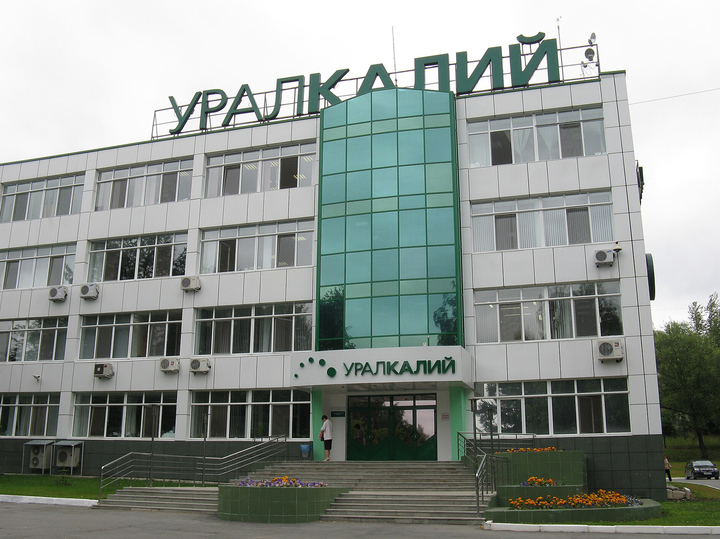 Central office of the Uralkali company (Berezniki city, Perm region).
Central office of the Uralkali company (Berezniki city, Perm region).
The only thing we can say for certain is that it was not a forced decision. No one took away Rybolovlev’s business, ousted him, or expelled him from Russia, as often happened in our Palestines and as happens, alas, to this day. There were no noticeable dark clouds on the horizon for his business either. In both of these cases, the sale would have been at a discount, but as for, for example, the sale of Uralkali, Rybolovlev, according to informed sources, demanded, on the contrary, a premium to the market price.
However, there is a lack of information one significant plus: the fewer facts, the greater the scope for assumptions. People who know Rybolovlev well note his amazing, almost instinctive strategic sense. Actually, this is confirmed by his entire life path. Therefore, perhaps, it would not be too bold to assume that even then, in the early 2010s, Rybolovlev understood which way the wind was blowing. And he decided that this trend was not on his way.
It is unlikely that there were political reasons here. Rybolovlev never showed visible sympathy for the opposition, even the systemic one. For example, when in 2005, that is, in quite “vegetarian” times, the then leader of the SPS Nikita Belykh turned to Rybolovlev with a request to provide financial support to the party during the campaign for elections to the Perm Legislative Assembly, the owner of Uralkali, according to Belykh, responded like this: “No, guys, I don’t play such games, I’m definitely with the authorities. If you are the party in power, then I will give money.”
Most likely, the oligarch simply felt a threat to his capital and to his comfortable existence, and realized that the further it went, the more difficult it would be to “cash in” and take the money to «safe havens» And if so, then Dmitry Evgenievich’s premonition did not deceive him at all. If so, then Rybolovlev really reeled in his fishing rods in time.
He is one of the few top-echelon Russian billionaires who can today calmly do business and enjoy life in a part of the globe hostile to Russia: Rybolovlev is not on any American, British, European Union, or any other Western sanctions lists. True, he appears on the Ukrainian list, but this, perhaps, does not count.
And the Russian billionaire is taking full advantage of this opportunity presented to him, or rather, acquired opportunity. And he’s in a hurry to live, and he’s in a hurry to feel. However, he is still not in a hurry to such an extent that he misses the benefit.
The oligarch's first high-profile purchase after he moved to a foreign land was the acquisition of Monaco. This happened in December 2011. The famous football club, which was in a financial and existential crisis, having been relegated from the first league of the French championship to the second division, was bought by Rybolovlev for a symbolic one euro. But — with a commitment to invest at least 100 million in it over the next four years.
Rybolovlev quite quickly managed to resurrect the decaying club, breathe new life into it: in 2013, Monaco returned to the first league, in 2017 became the champion of France, in the same year reached the semi-finals of the Champions League… But no less surprising is that that the entrepreneur also managed to make money from this.
In 2015, Monaco set a world record in the transfer market by selling players for over €200 million. A year later, in 2017, there was a new record: 360 million… In a word, what many initially thought was charity or entertainment — supposedly a Russian oligarch acquired a new toy out of nothing to do — turned out to be a very successful and profitable business -project.
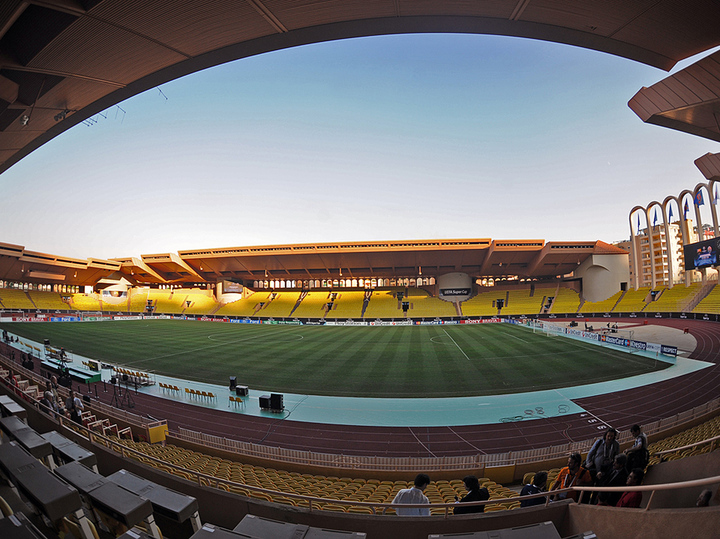 Stade Louis II, home of Monaco Football Club.
Stade Louis II, home of Monaco Football Club.
Rybolovlev’s next major foreign asset, which has become the talk of the town, is the Greek island of Skorpios, located in the Ionian Sea, off the western coast of Greece. The purchase price, according to available data, was about 100 million euros. More precisely, formally this is still not a purchase, but a lease. But very long-term — for 99 years.
This legal trick had to be taken, since the former owner of the island, the famous billionaire entrepreneur Aristotle Onassis, who left this world in 1975, forbade in his will the sale of the island until he the heirs will have enough money to maintain it. If there is no longer enough supply, the island must go to the state or, if it refuses, to Olympic Airways.
So, the island is also not fun, but an investment project, the end result of which should be an ultra-luxury resort for super-rich clients who crave privacy as much as comfort. The total cost of the project is reported to be 184 million euros, and there is no reason to doubt that this money will not go down the drain either.
But Rybolovlev also made unsuccessful purchases. With the acquisition of works of art, for example, things clearly did not work out. Assembling his collection, Rybolovlev resorted to the services of the Swiss art dealer Yves Bouvier, whom he then accused of fraud, namely, that he profited from him by shamelessly inflating the cost of the paintings being sold. At the same time, the oligarch filed claims against the Sotheby’s auction house, which, according to Rybolovlev, facilitated the fraudulent actions of the Swiss.
Although even here, not everything is clear. For example, Rybolovlev sold the painting “Savior of the World” by Leonardo da Vinci, purchased from Bouvier for $127.5 million, at Christie’s, earning 400 million greenbacks, and taking into account the auction house’s commission, it cost the buyer 450 million. To date, this is the most expensive painting ever sold at auction.
In general, so that, as they say, we live like this and suffer like this. Something tells us that these “torments” of the oligarch on a foreign side will not evoke sympathy not only from his ordinary compatriots who are not burdened with cyclopean fortunes, but even from his oligarchic colleagues who remain in Russia. They will cause some other, less kind feelings.

